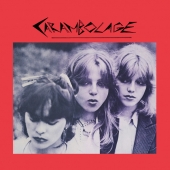
Carambolage
Carambolage
Label: Bureau B
Genre: 80s Wave / Rock / Pop / Punk
Availability
- LP €26.99 Dispatched within 5-10 working days
Backed by quirky organ and ragged drums, Elfie spits her lyrics with emphatic simplicity. Once her words are in your head, they stay there. Tracks like ›Die Farbe war Mord‹ hint at a sense of feminist awareness. Carambolage may not have coined the phrase, but »lipstick feminism« became a thing, consciously playing with feminine clichés and hammering them home in performative fashion, rather than boxing them off.
Towards the end of the record, vocals and sound are transcended in the monotone shimmer of ›22 rue Chenoise‹.
In the words of Carambolage’s ›City-Großmarkt‹ song:
»So, ladies and semen, are you ready? Time to go shopping.«
Carambolage never set out to be a »girl band« but they were one of the first German new wave bands whose members were all female. The punk alliance comprising Britta Neander, Elfie-Esther Steitz and Angie Olbrich emerged organically from the environs of Ton Steine Scherben, friends united by a common interest in musical experimentation.
Britta’s passion for the drums ignited in 1974 in Fresenhagen, North Frisia, where she played percussion for Ton Steine Scherben. What she really wanted was her own band, so she looked around for kindred spirits. R.P.S. Lanrue’s little sister Elfie-Esther was an obvious candidate. Angie, a child from the streets who joined the commune in 1972, completed the line-up. If you think that they simply followed in the Scherben slipstream, you’d be wrong: Carambolage surfed on their very own »North Frisian Wave« - an epithet dreamed up for their distinctive sound. Shortly before her death in 2004, Britta was interviewed by music journalist Tine Plesch and described how the »girls gang« gave them the freedom to experiment and come up with »these really funny, filthy lyrics«. There is a childish, subversive charm to the songs, emboldened by the realization that »we could fool around as much as we wanted.«
Their sound was not the only aspect of the group which resulted from experimental tinkering. Keen to have their own space, away from a male-dominated environment, they used cardboard and carpets to build their own practice room inside an old grain silo. Strictly out of reach of the Scherben. It’s fair to say that Carambolage helped to shape the DIY approach which the Riot Grrrls of the 1990s would emulate.
Forty years later, it’s still mostly men standing on festival stages, but the Carambolage story ought not be consigned to the shelves marked nostalgia. On the contrary, it is a thread which most definitely needs to be picked up. As Julie Miess, who later joined Christiane Rösinger and Britta in the Lassie Singers offshoot Britta (the band) noted so succinctly in her Carambolage text (›Damaged Goods‹, Ventil Verlag):
»Role models every seven-year-old girl should have!«
